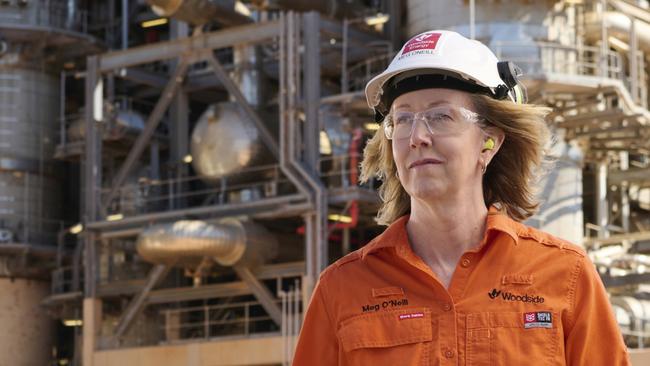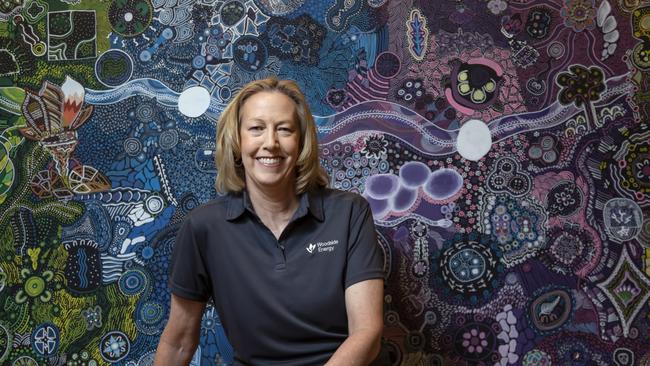‘There are lines that shouldn’t be crossed’: Meet Meg O’Neill, the Woodside Energy boss facing down fossil fuel fanatics
Meg O’Neill is one of the most demonised executives in Australia. But the Woodside Energy chief is convinced that without gas, Australia’s net zero push is doomed to fail.
National
Don't miss out on the headlines from National. Followed categories will be added to My News.
It’s complicated, says Woodside Energy chief executive Meg O’Neill.
But basically, the starting points go like this.
Australia cannot reach net zero without gas, no matter how much fossil fuel is demonised.
Renewable energy targets cannot be achieved without fossil fuels, which will have a critical role in the energy revolution until 2050 and beyond.
And many Australians, activist or otherwise, don’t understand the limits of renewable energy, albeit as pleasing as the concept sounds.
O’Neill, as the head of Australia’s largest oil and gas company, is an easy villain for depiction.
She proudly speaks of the company’s Scarborough gas field, off the West Australian coast, which has doubled for opponents as a powerful symbol of the unchecked recklessness of fossil fuel evils.
Scarborough will start delivering LNG in 2026. O’Neill expects it will still be pumping out fossil fuel, at a planned eight million tonnes a year, 30 or 40 years from now.

Yet as “villains” go – and her critics extend from extremists who tried to enter her property, to snarly billionaires who share their evangelical zeal, she presents as one of the friendlier ones.
She’s measured, and calm, in attributes not always associated with climate change discussions. O’Neill is a veteran of being shouted at – as she puts it, she’s a “big girl” who is “fair game”.
Opposition to her company has been a signature chorus line since she took over Woodside in 2021. Her own shareholders rejected the company’s proposed climate strategy plan earlier this year, a vote which she admits was “disappointing”.
Yet a sense of humour lurks beneath her straight talk about the worldwide inequities of energy availability. O’Neill can even poke fun at her love of the Fremantle Dockers.
She’s a diplomat of bearing; no elbows aimed at opposition players, such as south-eastern state governments which will probably run out of gas because they wield an ideological aversion to gas.
She believes that the “data” can and will displace the “aspiration” of those Australians who seek cheap, reliable and green energy – like, tomorrow.
“I think that for a period we’ve not been adequately vocal in communicating to citizens at large about the complexities of energy, and the complexities of energy transition,” she says.
O’Neill certainly does not patronise people for their lack of grasp. After all, how many Australians wonder about the international journeys that the fuel they pump into their cars have undergone in discovery, capture and refinement, and that after all that the fuel that they are pumping costs about the same as milk?
“I think it’s been very difficult to have a data driven conversation around energy use,” she says. “I’m an engineer by training, so that’s probably my default. But a lot of people view this from an emotional lens.”
O’Neill is hardly alone in speaking of the fossil fuel-driven renewables energy pathway. Yet it’s difficult to reconcile her matter-of-factness – that the world consumed more coal and oil last year than ever before – with the impassioned rhetoric of so many Australian politicians.
Renewables are great, she says. But they are also an intermittent source of power. The old line about the sun shining, and the wind blowing, and all those times that they don’t, holds true.
Into those times rolls gas-fired power generation, to plug the holes when weather conditions are still, dark and/or overcast.
She points that gas was the “hero” in 2022, when a number of coal-fired power stations went off line, and power supply was threatened – “some folks in the political world are probably averse to acknowledging that”.
“Gas has to be part of that future energy mix to give you the 24/7 on demand power that everyday people expect,” she says.
Yet gas has been rejected by south-eastern state governments. They now face the need for importing the stuff to cover the gaps in energy supply.
Victoria had a long-term moratorium on onshore gas exploration, and NSW has been seen to discourage gas company exploration.
Woodside has helped fuel such states through its Bass Strait gas reserves. But the reserves are thinning. Tapping new gas, following prolonged stagnation, takes years, especially with what O’Neill calls the “incredibly slow and burdensome” local regulations.
In November, South Australia mooted the future use of gas to cover the nation’s largest state renewable energy system.
South-east states now face the real prospect of importing gas, through floating terminals, even though Australia exports so much gas overseas, and even though untold reserves of the stuff sits under their feet.
O’Neill likens the anti-fossil fuel rhetoric of Australia to that of Britain, which has turned off coal and done “their best to destroy the oil and gas industry”. Manufacturing, and other industries which rely on traditional energy sources, have upped and left.
“I encourage you to call a regular citizen of the UK and ask how their power bills have responded to the changes,” she says.
Climate protesters are notoriously unabashed in their efforts to disrupt, impinge and interfere.
Last month, rock star and former ALP environment minister Peter Garrett, told The Australian that the expansion of fossil fuel production should be called “criminal behaviour”.
Last year, Andrew ‘Twiggy’ Forrest said O’Neill was “peddling poison” after learning from the biggest “liar”, ExxonMobil, where she worked for decades.
To that, she argues that “shouting and name-calling isn’t a way to have a constructive conversation”.
O’Neill became an unwitting tipping point late last year when protesters (accompanied by an ABC TV crew) were arrested outside her Perth home.
O’Neill was shaken, as was her wife and daughter who were home at the time. She later appeared in court over restraining order provisions against the protesters.
“Where it comes frustrating is when people take out their anger on our employees and community partners,” she says.
“The gas we supply goes to manufacturing facilities and supports jobs, not just jobs working for Woodside or our contractors, but jobs working for those downstream sectors.”
She says that public figures, whether they be business, political or sporting, assume “obligations”. But the protest efforts at her home “spotlighted” that certain forms of protest are “just not acceptable”.
“The positives that came out of that was the tremendous support that I’ve received and my family received from all across the community,” she says.
“I think after the events at my house things have quietened down a little bit. I think the public response sent a message to the protester community that there are certain lines that shouldn’t be crossed.”

Raised in Colorado, O’Neill studied engineering at Massachusetts Institute of Technology. But it might have been history she studied, which remains a passion many years later.
She has lived in Northern America, Europe, Asia and Africa, in both the developing and the developed world, and has always sought to understand a land’s past in the hope of understanding its present.
Australia is different, she says. Its prosperity has endured without major hurdles for many decades. “There’s a kind of recognition amongst many in other countries that are prosperous today that prosperity is fragile,” she says.
“Whereas I think many in Australia take prosperity for granted.”
O’Neill acknowledges that some Australians in the bush, or in poorer suburbs, don’t share in that assumption. “(But) the sentiment at the national level is one that is enduring, that things are going well for us, and they’ve always gone well for us, and therefore they always will go well for us.”
Throwing forward, how does she think history will judge her place in Australia and the world’s energy transition? Is she confident that her place in the promotion of oil and gas in a climate change world will fall on the right side of the ledger?
O’Neill doesn’t hesitate.
“Absolutely,” she says.



